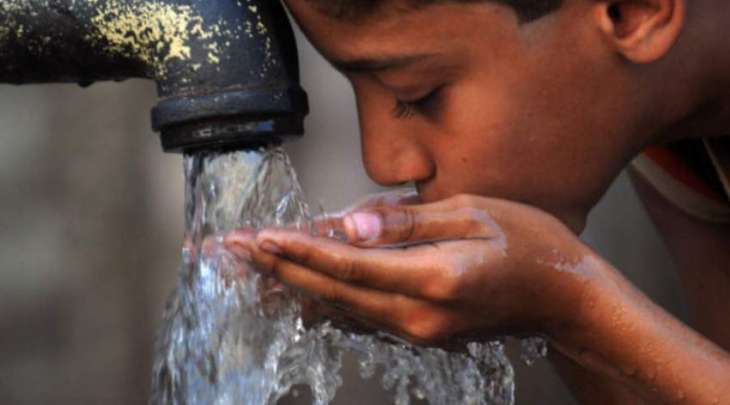Pakistan is the worst at its water governance and management
Karachi (Pakistan Point News / Online - 28th November, 2019) Pakistan is the worst at its water governance and management. Capacities of institutions dealing with water are exhausted and need to be enhanced".This was said by Sardar Muhammad Tariq, a water expert, CEO Pakistan Water Partnership (PWP), former member (water) WAPDA and former regional chair GWP - South Asia while addressing an informative session on "Water Security in Pakistan: Present Situation & The Way Forward" organized by the Council of Pakistan Newspaper Editors (CPNE) Editors Club here at its secretariat.
"We developed national water policy after 72 years but this also needs to be effective. Water saving and water conservation has to be strictly followed in all sub-sectors as water use efficiency is at its poorest" he added .Sardar Muhammad Tariq told that Pakistan is one of the world's most arid countries with over 75 percent of it receives rainfall less than 250 mm (millimeter) annually and 20 percent of it less than 125 mm. "The population and economy are heavily dependent on an annual influx into Indus River System of about 191 BCM (billion cubic meters) of water mostly derived from snow and glacier melt.
Since 2002, 12 BCM of water has disappeared, while surplus water is only available during 30 days and for remaining 335 days, water availability is less than demand," he added.He said that Pakistan uses more than 90 percent of water in agriculture sector against world average of 67 percent, while developed countries use even less than 50 percent. As per data India has reduced its use from 93 percent to 87 percent, China from 87 to 65 percent, whereas Pakistan is using 90 percent of water in this sector and irony is that no effort is being taken to reduce it.
Our three major crops rice, cotton and wheat use 90 percent of agriculture water. Data shows USA is using 42 percent, Germany 20 percent and France 15 percent of water in agriculture sector," Sardar Muhammad Tariq told.He lamented that Pakistan is also worst on productivity per unit of water. "Productivity per unit of water in Canada is 8.72 kg/one cubic meter, USA 1.56 kg, China 0.82 kg, India 0.39 kg as compared to 0.13 kg per one cubic meter of Pakistan.
Productivity per unit of land is also the least 2.24 T/ha among France 7.60 T/ha, Egypt 5.99 T/ha, Saudi Arabia 5.36 T/ha and India Punjab 4.80 T/ha. Gross Developed Product (GDP) contribution per one cubic meter water is 8.60 US$ average in the world whereas it is 30-40 US$ in developed countries, 10 US$ in Malaysia and 0.34 US$ in developing countries. Per capita storage in Pakistan is 52 cubic meters per person as compared to 6150 in USA and 5000 cubic meter in Australia.
It is very alarming situation for Pakistan. No country can develop without two resources water and energy. For arid country like Pakistan, storages are vitally important for water security, flood mitigation and drought proofing," he shared."Carry over capacity (one season to another; one year to another) of Pakistan is less than 30 days as compared to 120 to 220 days of India, 500 days (Orange River) of South Africa, 600 days of Australia, 900 days (Colorado) of America and 1,000 days (Niles) of Egypt (Aswan).
World countries secure 90 percent of drain water but unfortunately we have made no effort in this regard", he added.He further said that water has strong linkages with food security, energy security, health and wellbeing, development and employment - industries - exports, foreign exchange earnings - environment & biodiversity, forestry - life and national security. "On the other hand, water scarcity results in impediments to development like unemployment, hunger, water-borne diseases, environmental degradation, water thefts, water refugees, water terrorism and water wars," he warned.
Discussing way forward, Sardar Muhammad Tariq stressed that Pakistan has to improve its water governance and management, enhance capacities of institutions dealing with water, effective national water policy, follow water saving and water conservation strictly in all sub-sectors, introduce water use efficiency in the agriculture sector with enunciated objective of reducing water by 20 percent in it, introduce dry and salt tolerant variety of crops.
"Pakistan should introduce principles of three R's i.e. reduce, recycle, reuse. Rain water harvesting and facilities for ground water recharge have to be introduced. Fresh water bodies and ground water have to be protected from pollution - principle of user pays and polluter pays ore has to be adopted. Cheap solar technologies have to be introduced for desalinization of saline water. Storages need to be added to mitigate floods and droughts and to combat climate change impacts. Ground water governance has to be improved to balance extraction against recharge," he suggested.





